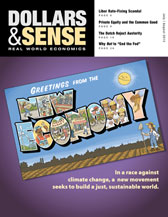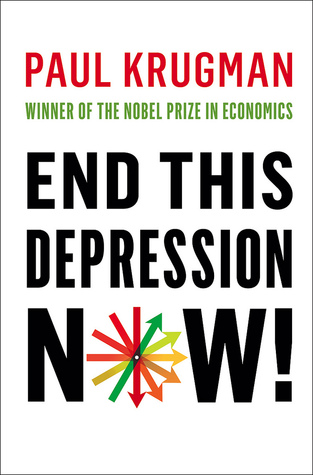This article is from Dollars & Sense: Real World Economics, available at http://www.dollarsandsense.org

This article is from the July/August 2012 issue of Dollars & Sense magazine.
Subscribe Now
at a 30% discount.

A Pall on Our Economy
A review of End This Depression Now!, By Paul Krugman. New York: W.W. Norton, 2012.Paul Krugman’s wit, incisiveness, and uncanny ability to present economic ideas clearly have made him a public intellectual as well as a New York Times columnist.
End This Depression Now!, as Krugman freely admits, contains little that will be new to followers of his blog and his Times column. It pulls together and fleshes out many previous arguments. Its broader goal is to influence public opinion and to persuade policymakers to adopt more expansionary economic policies. A worthwhile endeavor indeed!
As we enter the sixth year of our current slump, U.S. unemployment still exceeds 8%. Brief sightings of substantial economic improvement invariably turn out to be mirages. Austerity has become fashionable throughout the world. Policymakers focus on controlling inflation, restoring business confidence, and cutting budget deficits rather than dealing with high unemployment.
It doesn’t have to be this way. This timely book summarizes how we reached this point, provides a scathing critique of austerity policies, and explains how to get people back to work.
Its best sections detail the causes of our slump. We learn why financial bubbles (like the housing bubble) arise, and how greater inequality leads people to take on excessive debt and buy homes more expensive than they can afford. We also learn how deregulating the financial sector and then ignoring reckless lending has fueled speculative euphoria.
A burst financial bubble usually leads to retrenchment—less spending and higher unemployment. Keynes taught us that reducing unemployment requires monetary and fiscal policies to stimulate spending. To this Krugman adds debt relief, which would also enable struggling homeowners to spend more. He laments that these remedies have been deployed only half-heartedly.
As far as expansionary monetary policy goes, Federal Reserve Chair Bernanke reduced short-term interest rates to near zero and bought down long-term bond rates, but avoided the more radical measures that Bernanke himself had suggested to the Bank of Japan during Japan’s slump in the 1990s (such as a target of increasing inflation to 4%, which would reduce the real burden of existing debt).
Regarding fiscal policy, Krugman has long argued that President Obama’s stimulus plan was too small given the problems facing the United States. In early 2009, Krugman presciently warned that its failure would make it politically impossible to pass another stimulus. As for debt reduction, Krugman points out that numerous Obama programs to aid homeowners have resulted in little refinancing or debt reduction.
End This Depression Now! supports these arguments with extensive data and the passion that Krugman’s fans have come to relish.
After making so much of rising inequality as a cause of our problems, Krugman could have said a bit more about the heavy emphasis on tax cuts in the Obama stimulus, and the impact of those cuts (or lack thereof). I also wish he had spent more time on what policies are necessary to reduce household debt.
But my main unease with this book stems from its occasionally shrill tone. One good example of this is Krugman’s lambasting of Ben Bernanke.
Bernanke did what central bankers are supposed to do. It may not have been enough, but it did help save the financial system from collapse. His actions also gave banks plenty of excess reserves. The problem is that banks are not lending and cannot be forced to lend. While Krugman acknowledges this, whining that Bernanke has succumbed to “Fedthink” doesn’t advance a case for further monetary easing or higher inflation targets. Nor will this generate any sympathy at the Fed, making it less likely that Krugman will succeed in influencing policy.
Perhaps Krugman’s newfound grumpiness stems from anger at high unemployment and bad policymaking. Perhaps it is a reaction to constant attacks on him from both the right and the left. John Kenneth Galbraith, another economist-turned-public intellectual, waged battles similar to Krugman’s but maintained his sense of humor. Krugman used to do so too: during the Asian financial crisis of the late 1990s, after Thailand devalued its currency (the baht), he described the problem as “bahtulism.” Although it cannot solve an economic crisis, humor makes us more open to the analysis and policy solutions that follow.
Did you find this article useful? Please consider supporting our work by donating or subscribing.
